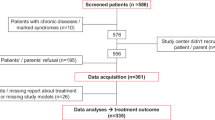Abstract
The introduction of modern quality thinking to orthodontic care should be a continuing effort on the part of the orthodontic profession.
The strategy for the development of a European quality management system in orthodontic care was developed from 1993 to 2000 during the EURO-QUAL project. During the project’s first stage, the basic prerequisites were identified for a general model of quality management in orthodontic care. A supra-national agreement was reached on policy statements for orthodontic care in Europe.
The essential components of an orthodontic quality management system are: linking orthodontic care to population need, patient partnership, clinical accountability, and containing costs.
Value-based health care and “TQM”, the philosophy of total quality management, are basic principles applied in accordance with the recommendations of the European Health Committee of September 1997 and the “Health-for-All” policy framework of the World Health Organization.
Zusammenfassung
Die Einführung moderner Qualitätsüberlegungen in die kieferorthopädische Patientenversorgung sollte ein ständiges Bemühen des Berufsstandes der Kieferorthopäden sein.
Die Strategie zur Entwicklung eines europäischen Qualitätsmanagementsystems wurde im Rahmen des EURO-QUAL-Projektes im Zeitraum von 1993 bis 2000 ausgearbeitet. Während der ersten Phase des Projektes wurden die grundlegenden Voraussetzungen für ein allgemeines Modell zum Qualitätsmanagement in der kieferorthopädischen Patientenversorgung festgelegt. Es wurde eine übernationale Übereinkunft zu Grundsatzerklärungen für die kieferorthopädische Versorgung in Europa getroffen.
Die tragenden Säulen eines Qualitätsmanagementsystems in der Kieferorthopädie sind: Anpassung der kieferorthopädischen Versorgung an den Behandlungsbedarf der Bevölkerung, Patientenbeteiligung, klinische Verantwortlichkeit und Begrenzung der Kosten.
Auf Nutzen basierende Gesundheitsfürsorge und die Philosophie des umfassenden Qualitätsmanagements (TQM) sind grundlegende Prinzipien, die in Übereinstimmung mit den Empfehlungen des Europäischen Gesundheitsausschusses vom September 1997 und dem Rahmenwerk „Gesundheit für alle“ der Weltgesundheitsorganisation angewendet werden.
Similar content being viewed by others
Author information
Authors and Affiliations
Corresponding author
Additional information
*Ins Deutsche übersetzt von Dr. S. Stein, Freiburg/Br.
Paper presented at the Annual Scientific Meeting of the German Orthodontic Society, Freiburg i. Br., Germany, September 2004
Rights and permissions
About this article
Cite this article
Prahl-Andersen, B. Quality Management in Orthodontics. J Orofac Orthop 66, 491–498 (2005). https://doi.org/10.1007/s00056-005-0522-4
Received:
Accepted:
Issue Date:
DOI: https://doi.org/10.1007/s00056-005-0522-4
Key Words:
- Quality management
- EURO-QUAL project
- European orthodontic quality system
- BIOMED 1 program
- BIOMED 2 program




